|
|
|
Sort Order |
|
|
|
Items / Page
|
|
|
|
|
|
|
| Srl | Item |
| 1 |
ID:
172564
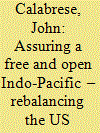

|
|
|
|
|
| Summary/Abstract |
Borrowing the term ‘Indo-Pacific’ from Japanese Prime Minister Shinzo Abe and refashioning the Obama ‘Pivot to Asia’ or ‘Rebalance Strategy’, the Trump administration has articulated a vision of a Free and Open Indo-Pacific (FOIP), which, as its public discourse and official documents reveal, is defined through the lens of great power competition with China. Since the latter part of 2017, the administration has laid the groundwork for a whole-of-government approach aimed at advancing this vision, which consists of three pillars: economy, governance, and security. Southeast Asia – a dynamic sub-region and the fulcrum of the wider Indo-Pacific – is central to the evolving US strategy. However, in its current form, that strategy casts China in the role of an existential threat and economic enemy, and seems overly focused on military security. For these reasons, it is unlikely to garner the full support of allies and partners – without which shared prosperity, good governance, and a peaceful and secure regional order across the Indo-Pacific cannot be assured. A repositioning and repurposing of the recently resuscitated Quadrilateral Security Dialogue (or Quad) could transform this minilateral platform into a useful instrument to coordinate the four members' actions, leverage the capabilities of Quad-Plus countries, and engage ASEAN in managing non-traditional security challenges and furthering its connectivity agenda.
|
|
|
|
|
|
|
|
|
|
|
|
|
|
|
|
| 2 |
ID:
172562
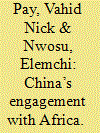

|
|
|
|
|
| Summary/Abstract |
This paper seeks to explore the political implications of China's economic relationship with Africa using the case study of Sino-Nigerian economic relations. China – perhaps the most prominent rising economy of the contemporary era – and Nigeria – one of the Africa's largest economies with a fast-growing consumer population – provide an ideal context to study the economic significance of bilateral ties for the ‘Global South.’ Nigeria's prospects of sustained economic growth, through Sino diplomatic relations, could appear relatively bleak considering issues involving its growing debt burden, unequal trade composition and deteriorating governance standards, some of which are attributable to China. This paper explores both sides of the argument before concluding that certain political aspects of Sino-Nigerian bilateral relations do indeed undermine sustainable economic development in the long run. It is argued that unequal economic practices, lack of transparency, disregard for environmental concerns, exclusion of civil society and absence of serious engagement with wider social actors and other checks and balances could indeed nurture elements of rentierism across Africa – particularly in resource-rich countries like Nigeria leaving significant detrimental effects that could well outweigh short-term gains.
|
|
|
|
|
|
|
|
|
|
|
|
|
|
|
|
| 3 |
ID:
172565
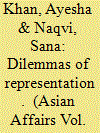

|
|
|
|
|
| Summary/Abstract |
Recognizing constraints Pakistani women legislators face despite their entry into politics on a 17 per cent quota in national and provincial assemblies, it is time to rethink how quotas can lead to their political mainstreaming. This article explores quota legislators' views on their own accountability and empowerment based on the first online survey in Pakistan with 200 women in the assemblies (2013-18). Findings show quota legislators resist classification as male proxies and view themselves as accountable to notional voters, although they are indirectly elected. Many report silencing and harassment by male colleagues. Cross-party women's caucuses in each assembly have a mixed track record of facilitating substantive representation, undermined by religious parties and class differences. Respondents favoured further affirmative action mechanisms to increase their political voice, e.g. additional quota requirements within parties, more tickets for general seats and participation in key decision-making bodies of parties. A trajectory for women in politics to move from quota seats (in local bodies and assemblies) to general seats is not yet in place.
|
|
|
|
|
|
|
|
|
|
|
|
|
|
|
|
| 4 |
ID:
172561
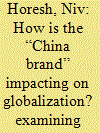

|
|
|
|
|
| Summary/Abstract |
This article is aimed at better understanding China's Overseas Foreign Direct Investment (OFDI) choices through a post-War Japanese historical perspective. It will focus in the main on OFDI as a marker of an advanced stage of the East Asian ‘developmental state’ formula, wherein the ‘China Brand’ takes shape. The transition process from heavy-industry and low-value added goods to frontier-technology manufacturing with global brand recognition will be placed under scrutiny. A Japanese perspective is called for, as much of the theory in the field of international business to do with OFDI and the growth of multinational corporations (MNCs) is currently primarily derived from a Western developed-economy setting, and hence does not seek to offer much in the way of predictive insight about all-important yet middle-income China, as it proceeds towards becoming the largest economy on the planet. The article surveys the historical trajectory of Chinese OFDI, underling its correlation with inbound foreign investment into China; it then offers a comparative view of Japanese OFDI in the pre- and post-War era. It then assesses Chinese brand strength in the electrical appliance, automobile, and IT areas. Finally, it offers a prognosis as to the future direction of Chinese OFDI, and how it might affect the contours of globalization as well as Sino-American rivalries.
|
|
|
|
|
|
|
|
|
|
|
|
|
|
|
|
| 5 |
ID:
172560
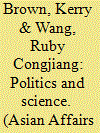

|
|
|
|
|
| Summary/Abstract |
The Coronavirus (2019-nCoV, or COVID-19) outbreak started in the central Hubei province in China. The spread of the disease across China, and now around the globe, is a multi-layered issue that affects both politics and science. On one level, it is a public health crisis in an area where developing China is particularly vulnerable. On another, it sheds light on the issue of governance under Xi Jinping and the strengths and weaknesses of his highly centralised style of rule in contemporary China. Finally, it also speaks to the current atmosphere in geopolitics, where the boundary between China and the world around it, and particularly with the USA, is growing deeper. This article will look at each of these issues in turn. The spread and global impact of the virus has proved to be a fast-moving phenomenon. It is likely to make an impact that will last not just for years, but decades. There is every possibility that globalisation will be recast and reformed, as a result. This is a very initial attempt to understand some of the factors that might go into this, as they can be seen at the time of writing (April 2020).
|
|
|
|
|
|
|
|
|
|
|
|
|
|
|
|
| 6 |
ID:
172566


|
|
|
|
|
| Summary/Abstract |
In early 2018, the Pashtun Tahafuz Movement or Pashtun Protection Movement (PTM) came suddenly into the limelight in Pakistan. The PTM is spearheaded by young firebrand Pashtun generation mainly from the war-torn North-West Frontier region of the country. However, the movement's rhetoric and policy agenda have put it at loggerheads with Pakistan's powerful military establishment. Whilst the PTM blames the Army for the plight of Pashtuns in the country, the military has labelled the movement as a foreign ‘proxy’ working at the behest of other countries against the institutions of its own state. In essence, both parties have resorted to conspiracy theories of one sort or the other. This development has strained the nascent process of ‘mainstreaming’ the Federally Administered Tribal Areas (FATA) into becoming a normalized part of Pakistan. However, there are some encouraging political aspects and developments related to this debate. These include the increasingly wide-scale use of social media for political activism and awareness; various impacts on merger of FATA with Khyber Pakhtunkhwa; and also the successful conduct of recent provincial elections in the region.
|
|
|
|
|
|
|
|
|
|
|
|
|
|
|
|
| 7 |
ID:
172563
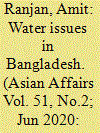

|
|
|
|
|
| Summary/Abstract |
At present, Bangladesh is self-sufficient in water. However, this self-sufficiency is by no means assured. Bangladesh's supplies of water are under threat through a combination of population growth, climate change, and pollution, sometimes caused by mismanagement. This article looks at the state of surface and ground waters in Bangladesh. It discusses the growing demand for water, pollution of the water bodies, and encroachment on the riverbeds, and the way in which this has been dealt with by Bangladesh's authorities. It argues that if things remain business-as-usual, it will become difficult for Bangladesh to continue with its high growth rate over the long term.
|
|
|
|
|
|
|
|
|
|
|
|
|
|
|
|
|
|
|
|
|